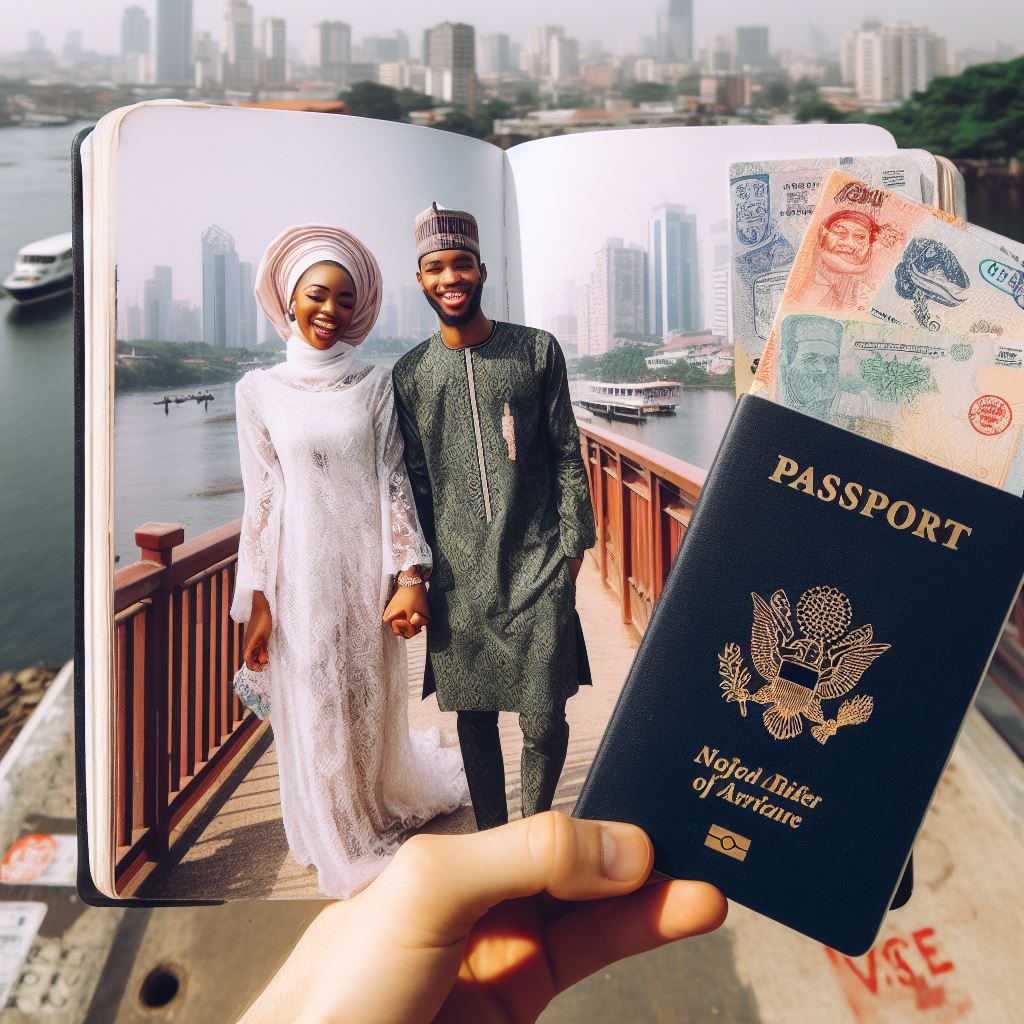Introduction
Let’s explore requirements for obtaining citizenship through marriage.
Obtaining citizenship through marriage is a significant topic that deserves attention.
Understanding the requirements is essential for those seeking to gain citizenship in this way.
Embarking on the journey towards citizenship is a monumental step, embodying dreams of belonging, stability, and shared futures.
For many, the avenue of marriage-based citizenship offers a unique pathway, intertwining love and legal status.
This route not only strengthens personal bonds but also upholds the societal fabric by fostering multiculturalism.
However, this path is not without its intricacies and prerequisites.
“This blog post will discuss the various requirements for obtaining citizenship through marriage in Nigeria.”
In this exploration, we delve into the comprehensive requirements one must navigate when seeking citizenship through marriage.
From legal frameworks to personal commitments, this process demands a nuanced understanding of both administrative protocols and the intricacies of marital unions.
Join us as we unravel the essential components that pave the way towards a harmonious and legally secure future as a citizen through marriage.
Overview of Nigerian Citizenship
In this section, we will provide an overview of the requirements for obtaining Nigerian citizenship through marriage.
Brief explanation of Nigerian citizenship laws
Nigerian citizenship is governed by the Nigerian Constitution and the Nationality Act.
It defines who is considered a citizen of Nigeria and outlines the various ways in which citizenship can be obtained.
Differentiation between citizenship by descent and citizenship by naturalization
There are two primary ways to acquire Nigerian citizenship. The first is through descent, which means being born to a Nigerian parent or parents.
Strengthen Your Marriage Today
Get personalized solutions for your relationship challenges. Receive expert Marriage Consulting tailored just for you in 1-3 days.
Get StartedThe second is through naturalization, which involves meeting certain criteria and going through a legal process to obtain citizenship.
The significance of obtaining citizenship for marital purposes
Obtaining Nigerian citizenship through marriage is important for individuals who wish to have a legally recognized status in Nigeria as the spouse of a Nigerian citizen.
It provides certain rights and benefits.
Now let’s delve into each aspect in more detail.
Brief Explanation of Nigerian Citizenship Laws
The concept of Nigerian citizenship is grounded in the Nigerian Constitution and the Nationality Act.
These laws clarify who is eligible to be a citizen of Nigeria and under what circumstances citizenship can be obtained.
The Constitution recognizes individuals born in Nigeria as citizens by birth.
It also grants citizenship to individuals whose parents are Nigerian citizens.
Differentiation between Citizenship by Descent and Citizenship by Naturalization
Citizenship by descent refers to individuals who are considered citizens based on their Nigerian parentage.
If at least one parent is a Nigerian citizen at the time of the child’s birth, the child is automatically considered a Nigerian citizen.
Citizenship by naturalization, on the other hand, involves a legal process and specific requirements that must be met for an individual to become a Nigerian citizen.
This process is open to foreigners who have lived in Nigeria for a specified period, demonstrated good character, and met other criteria.
Significance of Obtaining Citizenship for Marital Purposes
Obtaining Nigerian citizenship through marriage is particularly significant for individuals who are married to Nigerian citizens or are planning to marry a Nigerian citizen.
It provides legal recognition and rights as the spouse of a Nigerian citizen.
Words No One Else Can Say, Crafted Just for You
Envision your deepest feelings woven into vows, speeches, or letters uniquely resonating with your love story. We craft personalized expressions no one else can replicate, capturing your emotions in words that touch hearts.
Express YourselfSome of the benefits of obtaining citizenship through marriage include the ability to live and work in Nigeria without restrictions, the right to own property, access to healthcare and education services, and the ability to participate in political and social activities.
In short, Nigerian citizenship can be obtained through marriage, either by descent or naturalization.
Understanding the citizenship laws, the differences between the two processes, and the significance of obtaining citizenship for marital purposes is crucial for those seeking to establish their legal status as a spouse of a Nigerian citizen.
Read: Pros & Cons of Marriage-Based Citizenship in Nigeria
Marriage Requirements
Legal requirements for a marriage to be recognized under Nigerian law
- Age requirements play a significant role in determining the legality of a marriage. Nigerian law states that both parties must be at least 18 years old.
- Consent requirements are also essential. Both individuals entering the marriage must give their consent freely and without any duress.
- A marriage must be registered with the appropriate authorities to be recognized under Nigerian law. This registration process is a legal requirement.
These legal requirements ensure that marriages in Nigeria are valid and comply with the country’s laws.
Failure to meet these requirements can result in the marriage being considered invalid under Nigerian law.
The importance of a valid and legally recognized marriage for citizenship purposes
Obtaining citizenship through marriage often requires proof of a valid and legally recognized marriage.
Here’s why:
- Documentation: A valid marriage certificate serves as crucial documentation when applying for citizenship through marriage. It proves the existence of a lawful union.
- Legitimacy: A legally recognized marriage establishes a legitimate relationship between the spouses. This legitimacy is essential when seeking citizenship based on marriage.
- Proof of commitment: A valid marriage demonstrates a commitment to the relationship. It shows that the spouses have chosen to legally establish a life together.
- Legal rights and responsibilities: A valid marriage provides spouses with legal rights and responsibilities. These rights may be considered when determining eligibility for citizenship.
- Immigration requirements: Citizenship through marriage often involves navigating immigration processes. A valid and legally recognized marriage helps fulfill the necessary requirements for immigration purposes.
When applying for citizenship through marriage in Nigeria, it is crucial to meet the legal requirements for a valid marriage.
This ensures a smooth and successful citizenship application process.
Understanding the legal requirements for marriage in Nigeria and the significance of a valid and legally recognized marriage for citizenship purposes is vital.
Complying with these requirements allows individuals to navigate the citizenship process more effectively.
Your citizenship journey begins with a legal and recognized union.
Make sure you meet all the requirements and complete the registration process diligently.
Transform Conflicts Together
Imagine turning disagreements into growth opportunities. Our unique worksheets guide you and your partner through challenges, building a stronger bond like no one else can.
Embrace HarmonyRead: Navigating Nigeria: Marriage Citizenship Laws Explained

Eligibility for Citizenship through Marriage
Who is eligible to apply for citizenship through marriage?
Any foreign national married to a citizen of a country may be eligible to apply for citizenship through marriage.
Requirements for the Nigerian spouse
- Nigerian nationality: The Nigerian spouse must be a citizen of Nigeria.
- Length of marriage: The couple must be married for a specified period of time.
- Proof of genuine relationship: The couple needs to provide evidence of a bona fide marriage.
The importance of meeting these eligibility criteria
Meeting the eligibility criteria is crucial for obtaining citizenship through marriage as it determines the success of the application.
Read: The Art of Compromise: Key for Successful Nigerian Marriages
Application Process
Overview of the Application Process
To obtain citizenship through marriage, applicants need to follow a specific application process.
Required Documents and Forms
Applicants must provide certain documents and forms as part of their citizenship application through marriage.
Steps Involved in the Application Process
The application process for obtaining citizenship through marriage can be summarized as follows:
Submission of Application
Applicants need to fill out the application form, paying close attention to accuracy and completeness.
They must gather all necessary supporting documents, such as marriage certificates, birth certificates, passports, and photographs.
Additionally, any required fees should be paid at this stage.
Review and Assessment
Upon submission, the immigration authorities will review the application to ensure that all required information is provided and that the documentation is complete.
They will then assess the eligibility based on the criteria specific to obtaining citizenship through marriage.
Interview and Document Verification
To further authenticate the marriage and relationship, applicants will be called for an interview.
During the interview, they may be asked about their relationship history, shared assets, living arrangements, or any other relevant details.
The purpose is to confirm that the marriage is legitimate and not entered into solely for the purpose of obtaining citizenship.
Alongside the interview, document verification will take place.
The submitted documents will be carefully scrutinized to ensure their authenticity.
This process may involve cross-referencing with government databases or contacting relevant authorities to verify the information provided.
Decision and Notification
After completion of the interview and document verification, the immigration authorities will review the overall application and make a decision.
This decision could be the approval of citizenship, a request for additional documents or information, or the rejection of the application.
Once a decision has been reached, the authorities will notify the applicant in writing.
Upon approval, you’ll proceed with essential administrative tasks and attend an oath-taking ceremony as the next steps in the process.
However, in case of rejection or requests for additional information, applicants typically have the opportunity to address the concerns or provide the required documents within a specified period.
The application process for obtaining citizenship through marriage involves the submission of an application with all the required documentation, followed by a comprehensive review, an interview, document verification, and a final decision.
Read: How Parenting Shapes Marital Dynamics in Nigeria
Discover More: Intimacy in Marriage: A Guide for Nigerian Couples
See Related Content: A Guide to Traditional Nigerian Marriage Proposals
Benefits of Obtaining Citizenship through Marriage
The advantages of obtaining Nigerian citizenship through marriage
- Obtaining Nigerian citizenship through marriage grants you the right to live and work in Nigeria.
- By becoming a Nigerian citizen through marriage, you gain access to healthcare and social services.
- With Nigerian citizenship, you have the ability to sponsor your family members to reside in Nigeria.
Discuss the potential challenges and limitations
While obtaining Nigerian citizenship through marriage offers several benefits, there are also challenges and limitations to consider.
- Lengthy Process: The process of obtaining Nigerian citizenship through marriage can be lengthy and time-consuming. It involves filing several documents and going through a rigorous application process.
- Language and Cultural Barrier: Immigrants who obtain Nigerian citizenship through marriage may face challenges related to language and cultural differences. Adjusting to a new country and culture can be overwhelming.
- Dependence on Spouse: Those who obtain Nigerian citizenship through marriage may have a certain level of dependence on their Nigerian spouse for their legal status in the country. If the relationship dissolves, their citizenship status may be at risk.
- Financial Implications: While there are advantages to obtaining Nigerian citizenship through marriage, there can be financial implications as well. The process involves fees for applications, legal assistance, and other expenses that may arise.
- Limited Political Rights: Although citizenship through marriage grants the right to live and work in Nigeria, it may not grant full political rights. Some political rights, such as running for public office, may be reserved for natural-born citizens.
- Dual Citizenship Restrictions: Nigerian law restricts dual citizenship, which means that obtaining Nigerian citizenship through marriage may require giving up your previous citizenship in some cases. This can affect your rights and privileges in your home country.
- Introduction of Nigerian Laws: Upon obtaining Nigerian citizenship, you are subject to Nigerian laws and regulations. Familiarizing yourself with the legal system and understanding the rights and responsibilities can be challenging.
In a nutshell, Despite these challenges and limitations, many individuals find that obtaining Nigerian citizenship through marriage offers numerous advantages that outweigh the potential drawbacks.
It is important to carefully consider all aspects and seek professional advice before embarking on this journey.
Conclusion
In this blog section, we discussed the requirements for obtaining citizenship through marriage in Nigeria.
It is crucial to understand these requirements to ensure a smooth and successful citizenship application process.
For individuals seeking citizenship through marriage, it is important to gather all necessary documents, stay updated with the latest laws, and seek professional help if needed.
Overall, obtaining citizenship through marriage in Nigeria requires meeting specific criteria and following legal procedures.
It is necessary to have a clear understanding of these requirements to avoid any complications or delays in the application process.
To recap, we highlighted the importance of fulfilling the necessary conditions set by the Nigerian government, such as having a valid marriage certificate and residing in the country for a specified period.
Meeting these requirements is essential for a successful citizenship application.
Individuals seeking citizenship through marriage should prioritize research, proper documentation, and adherence to Nigerian laws.
It is advisable to consult with immigration experts or legal professionals to ensure a smooth and efficient process.
Understanding the requirements and taking all necessary steps will increase the chances of obtaining citizenship through marriage in Nigeria.
Remember, obtaining citizenship through marriage is a significant decision that carries long-term implications.
Make sure to carefully follow the guidelines, seek professional advice, and fully comprehend the requirements before proceeding with the application process.




